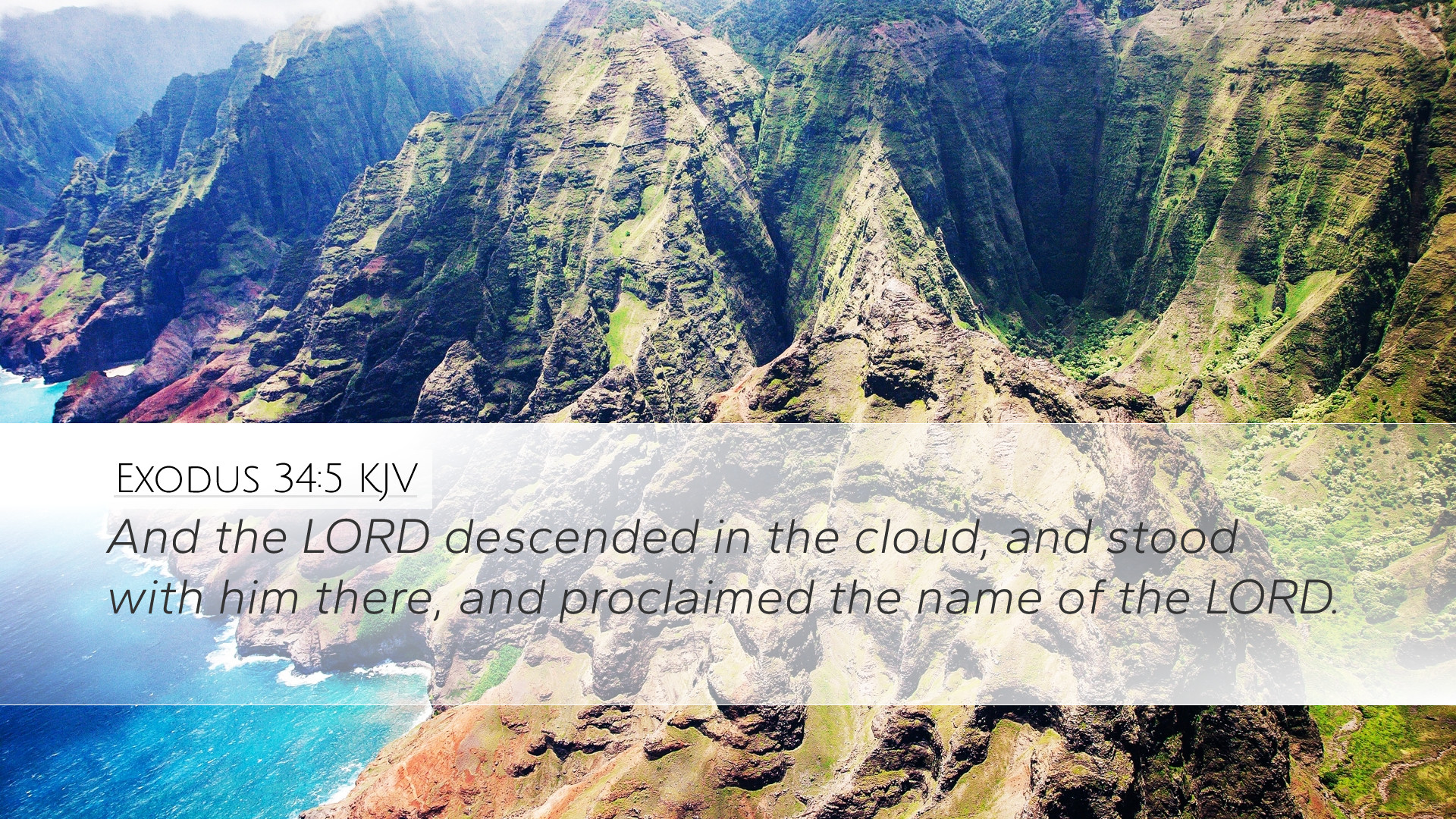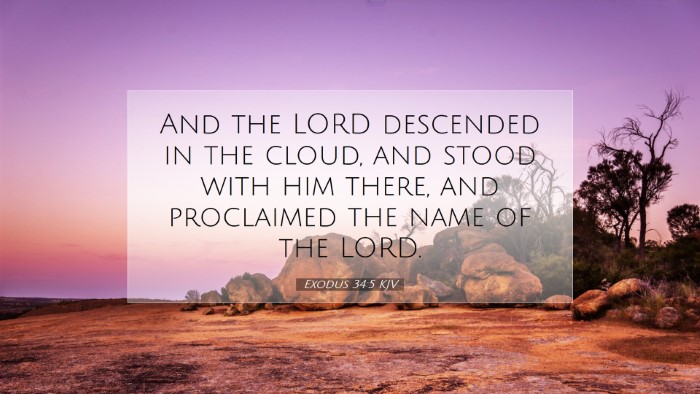Exodus 34:5 Commentary
Verse Reference: Exodus 34:5
"And the Lord descended in the cloud, and stood with him there, and proclaimed the name of the Lord."
Introduction
This passage presents a profound moment in the narrative of Exodus where God reveals Himself to Moses. The implications of His presence, declaration of His name, and the covenant relationship with Israel are theologically rich and warrant careful examination. Through various public domain commentaries, we explore the dimensions of this verse, emphasizing its significance in the lives of believers, church leaders, and scholars.
The Divine Revelation
Matthew Henry emphasizes that the descent of the Lord in a cloud is illustrative of divine condescension. God's willingness to engage with humanity reflects His mercy and desire for relationship. The cloud symbolizes God's majesty and transcendence, while His personal presence with Moses underscores intimacy. This duality illustrates that the God of Israel is both transcendent and immanent.
Albert Barnes notes that the cloud indicates God's glory. The glory of the Lord, often obscured by the cloud, signifies holiness and invites awe. This moment serves to remind believers that while God is near, He is also greatly to be revered. The physical manifestation of God in this cloud reveals the gravity of His nature to human beings.
Adam Clarke suggests that Moses’ experience here is unprecedented and delineates the unique role he plays as a mediator. Clarke articulates that this self-revelation is pivotal not just for Moses, but for the entire nation of Israel, as it reinforces God’s authority and governance over them. As Moses stands in the presence of God, it is a critical moment for receiving divine instruction and understanding God’s character.
The Name of the Lord
God's proclamation of His name is central to this passage. Each commentator reflects on the significance of God's name as revealing His nature and character.
Matthew Henry asserts that God's name embodies His attributes and deeds. By proclaiming His name, the essence of God's being is made known to Moses. It serves not only as an introduction but as an affirmation of God’s steadfastness and faithfulness to His covenant with Israel. This proclamation is crucial as it sets the stage for Moses' subsequent interactions with God and the Israelites.
Albert Barnes reflects on the implications of knowing God’s name. He explains that through God’s name, believers come to grasp His righteousness, justice, mercy, and grace. Such knowledge is foundational for worship and relationship. The name becomes a conduit through which the faithful understand God’s actions and purposes in their lives.
Adam Clarke further delves into the historical significance of God's name within the Hebrew context. He posits that understanding God’s name goes hand in hand with understanding His covenant promises. Clarke highlights how the declaration of God’s name facilitates a deeper commitment to follow Him and trust His leading as evidenced by His past actions.
Theological Implications
This passage raises significant theological themes that have implications for contemporary faith and practice:
-
The Nature of God: The multifaceted nature of God becomes clear through this verse; He is holy, good, and present, inviting exploration of His character and the implications for worship.
-
Divine Revelation: God's self-disclosure is essential for understanding His will. This underscores the importance of scripture as the primary means through which God continues to reveal Himself to His people.
-
Mediatorial Role of Moses: The relationship between Moses and God epitomizes the need for mediators in faith, leading to discussions about the ultimate mediator, Jesus Christ.
Practical Applications
Understanding Exodus 34:5 offers several practical applications for pastors, students, and theologians:
-
Encouragement in Worship: Recognizing the majesty of God should inspire deeper reverence and worship in the church community.
-
Engagement with Scripture: This passage invites deeper study of God’s character in both Old and New Testaments, encouraging a robust theological understanding.
-
Encouragement for Leadership: Like Moses, leaders are called to seek God’s presence and guidance, reflecting His truth to their communities.
Conclusion
Exodus 34:5 serves as a profound reminder of God's desire to relate to His people. The depth of His character revealed in this moment rounds out an understanding of His love, grace, and holiness. For pastors, students, theologians, and scholars, this passage is rich with implications for personal faith and communal practice.
As we reflect on God’s intimate call to Moses and His declaration of name, may we be compelled to seek God with the same fervor and openness, recognizing His ultimate sovereignty in our lives.


